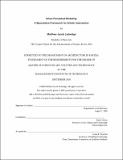| dc.contributor.author | Ledwidge, Matthew Jacob. | en_US |
| dc.contributor.other | Massachusetts Institute of Technology. Department of Architecture. | en_US |
| dc.date.accessioned | 2021-12-17T18:24:09Z | |
| dc.date.available | 2021-12-17T18:24:09Z | |
| dc.date.copyright | 2020 | en_US |
| dc.date.issued | 2020 | en_US |
| dc.identifier.uri | https://hdl.handle.net/1721.1/138582 | |
| dc.description | Thesis: S.M. in Art, Culture and Technology, Massachusetts Institute of Technology, Department of Architecture, September, September, 2020 | en_US |
| dc.description | Cataloged from the official PDF of thesis. | en_US |
| dc.description | Includes bibliographical references (pages 43-47). | en_US |
| dc.description.abstract | Cities have always been informational systems which impact or manage the perceptual and behavioral experience of human beings. Recent discussions primarily in urban planning, architecture, and the environmental humanities have pointed towards the ways in which contemporary cities are generating increasingly complex images, deploying a range of computational technologies, regulatory frameworks, and social norms which are less legible to people and more intertwined within technoscientific governance. Computational technologies of perceptual simulation in particular, are producing a new political, aesthetic, and epistemic terrain to consider within the field of urban planning and architecture. In this text I will provide an account of the development of technologies of modeling perception in urban space. I will claim that greater understanding of the histories and technical infrastructures of modelled perception and the co-produced nature of perception in real urban spaces provides the basis for a critical reevaluation of planning practices. I will present a number of artistic experiments which were undertaken to critically inhabit these new conceptual terrains and outline a speculative framework for future artistic practices to work with the ongoing impacts of these technologies on the everyday experience of urban space. I will discuss how these social and technical conditions might constitute a site of leverage towards a new political and aesthetic optic for engaging with urban experience and outline the basis for a framework of an artistic research practice operating around these concerns. | en_US |
| dc.description.statementofresponsibility | by Matthew Jacob Ledwidge. | en_US |
| dc.format.extent | 47 pages | en_US |
| dc.language.iso | eng | en_US |
| dc.publisher | Massachusetts Institute of Technology | en_US |
| dc.rights | MIT theses may be protected by copyright. Please reuse MIT thesis content according to the MIT Libraries Permissions Policy, which is available through the URL provided. | en_US |
| dc.rights.uri | http://dspace.mit.edu/handle/1721.1/7582 | en_US |
| dc.subject | Architecture. | en_US |
| dc.title | Urban perceptual modeling : a speculative framework for artistic intervention/ | en_US |
| dc.type | Thesis | en_US |
| dc.description.degree | S.M. in Art, Culture and Technology | en_US |
| dc.contributor.department | Massachusetts Institute of Technology. Department of Architecture | en_US |
| dc.identifier.oclc | 1288582670 | en_US |
| dc.description.collection | S.M. in Art, Culture and Technology Massachusetts Institute of Technology, Department of Architecture | en_US |
| dspace.imported | 2021-12-17T18:24:09Z | en_US |
| mit.thesis.degree | Master | en_US |
| mit.thesis.department | Arch | en_US |
